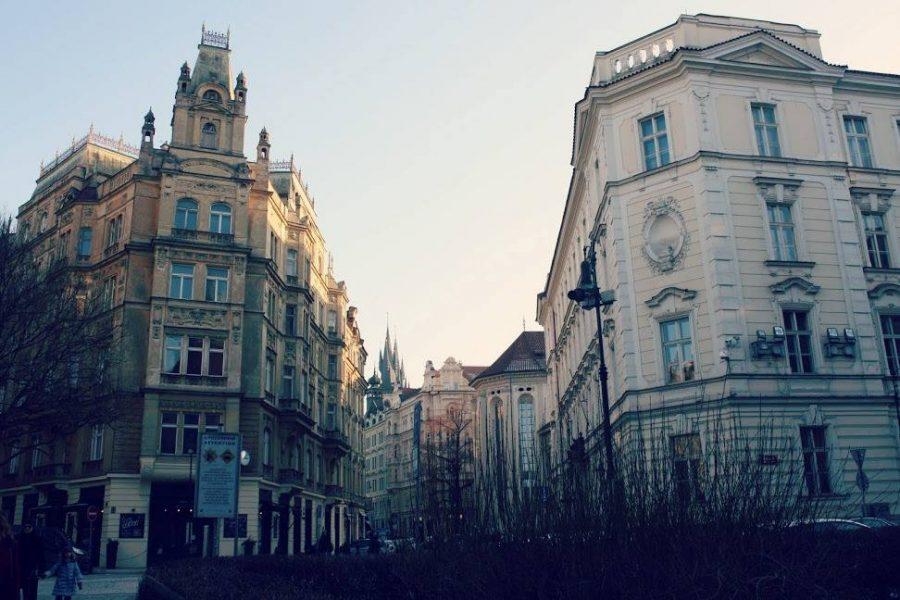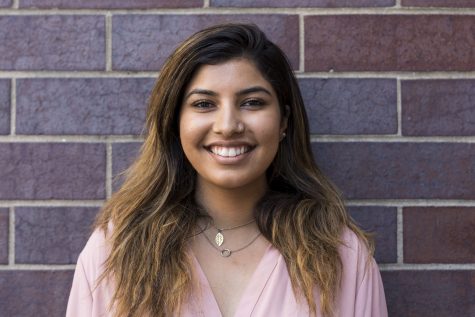Prague: Learning to Reconnect From 4,000 Miles Away
In Prague, people seem less obsessed with their cellphones than those in the United States.
March 9, 2017
While having dinner with my RA during my second week in Prague at a nearby restaurant, I couldn’t help but notice her eyes. It may sound weird, but as my RA sat across from me, slurping goulash soup and drinking a beer, I couldn’t shake the feeling that there was something special about her eyes.
Later, I realized it wasn’t her eyes that were particularly striking. The eye contact had seemed so direct because we weren’t once interrupted by a shiny screen — a screen that had always intruded into all of my conversations. For the entirety of the meal, not once did anyone look at their phones.
This surprising detail followed me throughout my initial days in Prague. I began noticing almost nobody looked at their phones, let alone have them in their hands. Walking down the street, when you look at someone, they look right back at you — not at their phones. No one is talking to their friends on the phone while rushing up from the metro, no one is checking their emails at restaurants, there are no teenagers in coffee shops scrolling through their Facebook feeds out of boredom. They are simply paying attention to the people and the world in front of them.
When I think back to the streets I love in New York City, I picture almost every New Yorker with phones in their hands. The man at the halal stand is talking to a friend on his cell phone, a woman is looking up directions on the side of the street, a group of friends are checking their phones to see where their Uber is. But here in Prague, everybody’s eyes are open. Everyone is awake.
When is the last time you spent an extended amount of time with someone without taking a quick glimpse at your Twitter feed? It seems almost second nature with most of the people that I spend time with. During brunch, one of my friends will inevitably pull out their phone to capture the Insta-worthy french toast and coffee placed before us. Likewise, whenever my sister does something funny in public, I have to whip out my phone to capture it on Snapchat.
So why do we Americans care so much about those precious little screens, especially compared to Europeans? Why do we feel the need to document every encounter with a friend, every meal, anything we do that will give our followers the perception that we’re fun, interesting people?
I can’t speak for all European countries, but from the knowledge I’ve gleaned from my classes in the past month, the Czech might be a more reserved people because of their history. After spending decades under Adolf Hitler’s totalitarian rule and another 40 years under an oppressive communist regime, the Czech Republic recently gained independence in 1990. As a result, Czech people seem to keep to keep to themselves — only spending time with their families and a few close friends. Most Czech people seem happy and content in their own little worlds, unconcerned with how they are perceived by others. With no one constantly scrutinizing your life, there is no pressure to constantly broadcast what you’re doing.
Now that I am in Prague, I want to try my best to live like a native and that includes shutting off my screen. I certainly can’t promise that I won’t be taking any pictures or uploading anything to social media — I have years of being an American teenager in my blood, after all — but I’m not going to let my internet presence dictate my actions. I want to learn how to do things just for myself, unmotivated by a picture for my feed.
A few days ago, when the weather had cleared up enough to make going outside bearable, I decided to take a walk across the Charles Bridge. Despite a few tourists walking alongside me, the scenery was calm and pleasant. The view was breathtaking — Gothic-style castles peeked out from the horizon of snow-brushed mountains. I reached into my pocket to take out my phone, and then I stopped, reminding myself to just be in the moment.
I opened my eyes to see for myself — not for anyone else. I didn’t feel the need to validate my enjoyment by taking a picture of the view in front of me for Snapchat or Instagram. This memory was going to be just for me, and it wouldn’t leave any technological footprint — just the picture that I would have in my mind.
I watched my breath disappear in the mist hanging above the Vlatva River. I felt content, I felt happy and for the first time in a long time, I felt present.
Email Ankita Bhankot at [email protected].




























































































































































